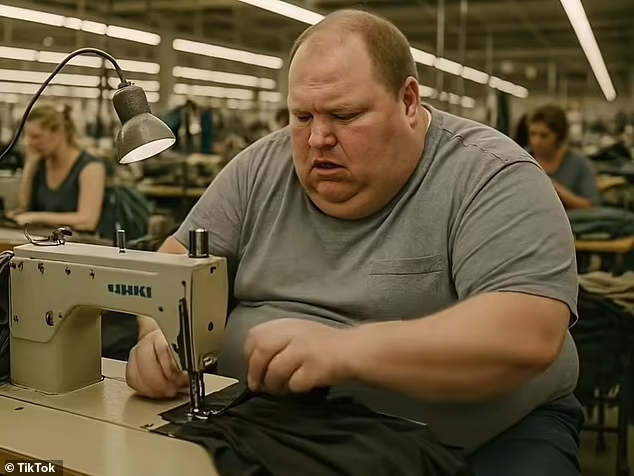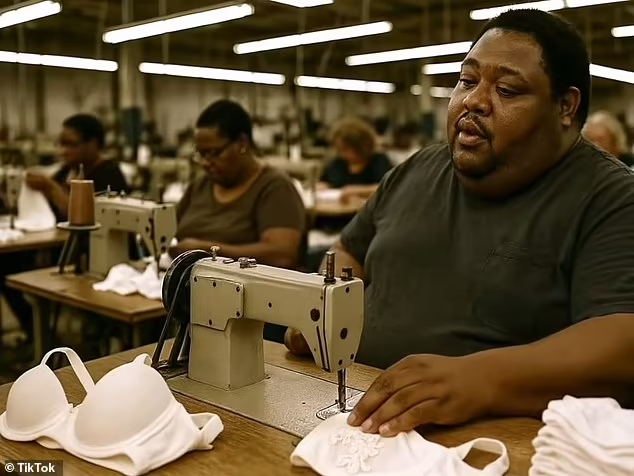An artificial intelligence-generated video allegedly created by a Chinese TikTok user has gone viral for its satirical portrayal of life in the United States under President Donald Trump’s tariff policies. The video has drawn widespread attention across social media platforms and intensified debate over trade relations between the US and China.

The 32-second video features AI-rendered depictions of morbidly obese American workers dressed in sweat-stained clothing, laboring in dimly lit factories and sweatshops. The background audio includes melancholic Chinese music, creating a somber tone. Each character appears fatigued and emotionally drained, reinforcing negative stereotypes about American labor and productivity.
As the video concludes, it displays the phrase “Make America Great Again,” referencing Trump’s well-known campaign slogan. The narrative appears to mock the idea that manufacturing jobs lost to overseas markets could return to the United States through tariff enforcement.
The video’s timing coincides with renewed tariff disputes between Washington and Beijing, which have led to heightened tensions and threats of steep import fees from both sides. This satirical clip is being circulated widely amid the ongoing trade battle, viewed by some as a digital propaganda effort targeting US economic policy.
The video was posted by a TikTok user identified as Ben Lau. Until now, Lau’s TikTok account had minimal activity, with fewer than 1,000 followers and only three previous videos. Despite its modest origins, the video was reposted by a user on X (formerly Twitter) and quickly went viral, surpassing five million views.

The clip has sparked intense commentary online. One user wrote, “Low-skilled manufacturing will never come back to the US. Highly skilled manufacturing won’t come either because we gutted education and don’t have the highly skilled workforce.” Another added, “America will become the poorest country in the world under Trump’s rule.”
Some responses, however, attempted humor. One user joked, “That sewing machine could be made in China,” in reference to the setting of the video.
Reactions to the video appear to be mixed, with both Chinese nationals and American users critical of the Trump administration expressing approval of the satire. The video has become a flashpoint in broader debates about the impact of tariffs on the US economy and perceptions of American labor globally.
Defending the administration’s trade policy, US Vice President JD Vance recently addressed the growing economic rift between the two countries. During a Fox News interview, Vance stated that China’s economy was built by “peasants” and claimed, “We borrow money from Chinese peasants to buy the things those Chinese peasants manufacture.”
Vance further criticized the globalist economy, saying it has burdened the US with unsustainable debt in exchange for foreign-manufactured goods. “What has the globalist economy gotten the United States of America? And the answer is, fundamentally, it’s based on two principles – incurring a huge amount of debt to buy things that other countries make for us,” he said.
The Chinese government quickly responded. During a press conference, Foreign Ministry spokesperson Lin Jian condemned Vance’s comments, calling them “astonishing and lamentable,” and accused the US Vice President of making “ignorant and disrespectful” remarks.
As digital rhetoric intensifies, real-world economic policy also escalates. On Monday, President Trump threatened to impose a 50% tariff on Chinese goods if Beijing does not withdraw its newly announced 34% retaliatory tariffs on US imports. Trump issued an ultimatum via his Truth Social platform, stating the higher tariffs would take effect on April 9, 2025, if China did not reverse course by April 8.
Beijing’s 34% tariff increase was in response to Trump’s latest global tariff measures, which have already contributed to a sharp 4,000-point decline in US stock markets. Trump warned that continued Chinese retaliation would lead to the cancellation of further trade talks and negotiations.
The broader conflict over manufacturing jobs—a central issue of the Trump administration since 2017—is again under the spotlight. Trump has long argued that imposing tariffs on Chinese goods would incentivize companies to bring production back to the US, creating jobs and reducing dependence on foreign labor.
However, social media discourse, including the viral AI-generated video, now questions whether American workers would be willing or able to resume labor-intensive manufacturing roles, given long-term shifts in the labor market, education systems, and economic priorities.
The video and its global reaction underscore the increasingly complex intersection of digital media, international relations, and economic policy in the US-China trade war era.



